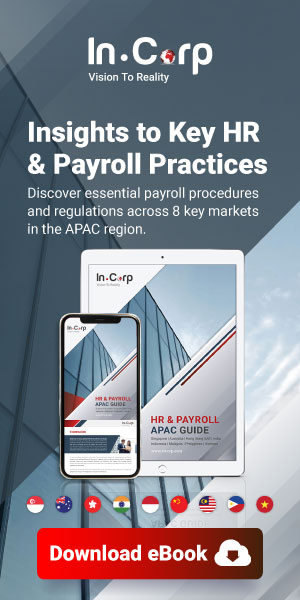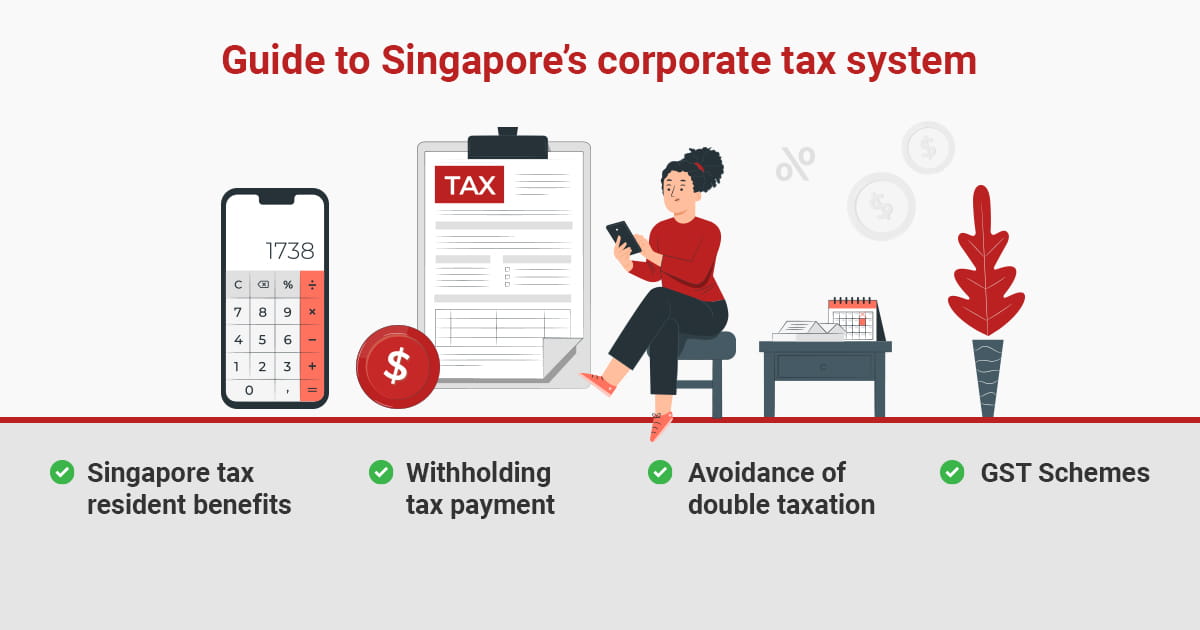Corporate Tax System in Singapore
The corporate tax framework in Singapore is one of the world’s leading regimes due to its low effective corporate tax rates, and is equipped with many incentives that help reduce these rates. Firstly, the corporate tax regime in Singapore has a territorial based system where only income generated within Singapore and income remitted or deemed remitted into Singapore is taxed based on the regime. Secondly, the city-state has had a single-tier income tax system since 2003, where the chargeable income taxed is the “final” tax. This means that no further tax is implemented on the dividends distributed from the company to its shareholders. Thirdly, there is no tax on capital gains in Singapore – including gains on sale of fixed assets, gains on sale of capital assets and gains on foreign exchange of capital transactions. Lastly, over the years since 1997, the headline tax rate has been decreasing from 26% to 17%, and the effective tax rates are even lower than that after tax exemptions and other incentives. Therefore, Singapore has become a popular business hub for both local and foreign investors to set up their businesses here and contribute to the economic growth. FREE Tool: Singapore Corporate Income Tax Calculator Related Read: Guide to Understanding Estimated Chargeable Income (ECI)Tax Resident Benefits in Singapore
Generally, a company is considered a tax resident in Singapore if control and management of the business is exercised in Singapore. The location of “control and management” of a business is generally where the Director/Board of Directors’ meetings are held. On the other hand, a company is considered non-resident in Singapore if these meetings are held outside Singapore. As a tax resident of Singapore, a company would be eligible for (amongst other conditions) the following:- Tax benefits provided under Avoidance of Double Taxation Agreements (DTAs)
- Tax exemption on foreign-sourced dividends, foreign branch profits, and foreign-sourced service income under Section 13(8) of the Income Tax Act; and
- Tax exemption for new start-up companies.
Related Read: Will the G7’s Global Minimum Tax Rate affect Singapore? »
Payment for Withholding Tax
Under Singapore’s withholding tax laws, for payments made to non-resident companies or individuals and for certain types of income generated in Singapore, a percentage of the payment has to be withheld and paid to the Inland Revenue Authority of Singapore (“IRAS”) by a stipulated date from the date of payment. As a territorial tax system in Singapore, (certain types of) income generated within Singapore will be taxed on non-residences in this manner.
Avoidance of Double Taxation
Singapore has concluded over 90 tax treaties with several countries and the number will continue to grow. This tax treaty is an agreement amongst Singapore and another country on how an income earned in either country will be taxed by both countries, especially if the company is involved in doing business in both countries. The objective of the tax treaty is to help businesses avoid double taxation on the same income. In addition, Singapore has begun granting unilateral tax credits to local companies for companies who earn income from countries without tax treaties with Singapore. These tax credits are granted to prevent double taxation on the same income.Industry Specific Tax Incentives
Amongst numerous types of businesses, the IRAS has implemented certain tax rules and incentives for some industries. For more information, please refer to Specific industries. At InCorp, we offer comprehensive taxation services for companies, including identifying tax schemes that will help benefit your business:- Preparing and submitting income tax returns and computations
- Optimise tax benefits (such as tax exemptions, double tax relief etc.) by identifying them in the process of preparing the tax computations
- Liaising, preparing replies and submission to the IRAS’ queries
- Withholding tax preparation and submission to IRAS
- Application for Certificate of Residence (COR)
Goods and Services Tax (“GST”) in Singapore
A GST-registered business may claim GST incurred in their purchases and expenses, if allowed, but must also charge GST on their taxable supplies. The business will serve as an agent of IRAS to collect GST from its supplies while claiming from IRAS GST incurred on their allowable expenses and purchases. Businesses are required to register for goods and services tax in Singapore when their taxable turnover (revenue) is more than S$1 million at the end of a calendar year, or if they expect their taxable turnover to be more than S$1 million in the next 12 months. Businesses may also voluntarily register for GST as a business decision. Some businesses may be liable to register for goods and services tax in Singapore under the Reverse charge and Overseas vendor registration regime. Please refer here for more information.GST Review
Occasionally, IRAS may request for a compliance review on a business’ past GST declarations (GST Form F5), including basis and workings of arriving at the output and input GST. These reviews may also query the activities of the businesses and application of the correct GST regulations.Using IRAS’ Assisted Self-Help Kit (“ASK”)
In addition to registering for goods and services tax in Singapore, IRAS has several GST Schemes that may be beneficial to businesses. When applying or renewing certain GST Schemes, IRAS requires businesses to perform an ASK Annual Review prior to the application or renewal of the following GST Schemes.Applying for GST Schemes
- Import GST Deferment Scheme (IGDS);
- Approved Marine Customer Scheme (AMCS);
- Approved Contract Manufacturer and Trader (ACMT) Scheme;
- Approved Refiner and Consolidator Scheme (ARCS);
- Major Exporter Scheme (MES);
- Approved Import GST Suspension Scheme (AISS); or
- Approved Third Party Logistics (3PL) Company Scheme.
Renewing GST Schemes
- Import GST Deferment Scheme (IGDS);
- Major Exporter Scheme (MES); or
- Approved Contract Manufacturer and Trader (ACMT) Scheme.
- An individual accredited with Singapore Chartered Tax Professionals Limited (“SCTP”) as Accredited Tax Advisor (GST) [ ATA (GST) ] or Accredited Tax Practitioner (GST) [ ATP (GST) ] OR
- The GST-registered business and certified by an individual accredited with SCTP as ATA (GST) or ATP (GST), in adherence to the certification procedures set out in the e-Tax Guide.
Benefits of Adopting ASK
- Understand GST requirements on filing and record-keeping;
- Review the accuracy of GST submissions
- Reduce the risk of incurring penalties on common errors made by GST-registered businesses;
- Discover past GST errors early for timely disclosure to IRAS to enjoy zero or reduced penalties under IRAS’ Voluntary Disclosure Programme (“VDP”);
- Enjoy administrative concessions for common errors disclosed through the course of ASK Annual Review; and
- Fulfil requirements for application or renewal of GST schemes listed in Point 1 of this Guide.
Errors discovered in the course of the ASK Annual Review
IRAS will waive the 5% late payment penalty if businesses undertake the ASK Annual Review to voluntarily disclose past error(s) within one year from the statutory filing date of their last GST return in respect of (i) the financial year or (ii) the 12-month period reviewed. To ease businesses’ review, IRAS recommends that the ASK Annual Review be conducted based on their financial year. For businesses that do not adopt ASK, the penalty will be waived only if the voluntary disclosure was made within one year from the statutory filing deadline of each GST return. This means businesses adopting ASK Annual Review may enjoy a longer grace period for disclosure of errors. This is provided that all the qualifying conditions under the VDP are met, and the situation does not fall within the specific exclusions from the programme. For voluntary disclosures made after the one-year grace period, IRAS will impose a reduced penalty of 5% of tax undercharged if the conditions under the VDP are met. IRAS also grants administrative concession for common errors if these quantifying errors are discovered during the ASK Annual Review. There is no need to seek the Comptroller’s approval to enjoy any of these administrative concessions. No penalties will be imposed on these errors as long as the errors fall within the scenarios described in the list of administrative concessions. At InCorp, we offer the following GST services:Our services – GST
- Application for GST registration/exemption
- Liaising and correspondence with IRAS on queries raised
- Preparing workings, replies, and reports for submission in relation to queries raised
Our services – ASK
- Reviewing GST declarations submitted to IRAS during the past financial year
- Performing sample checks on supplies and purchases
- Reviewing sample checks on supplies and purchases performed by businesses
- Review reconciliation of revenue and total supplies declared
- Completing the VDP or administrative concession for common errors
- Certifying the ASK Annual Review
- Providing recommendations on errors and weaknesses discovered during the ASK
FAQs
What are some key benefits of corporate taxation in Singapore?
Singapore’s corporate taxation regime is attractive among companies and here are some benefits:
- Low corporate tax rate of 17%
- No tax on dividends paid to shareholders
- No tax on capital gains
What are some tax benefits for a company that is a Singapore tax resident?
As a tax resident in Singapore, a company will enjoy the following benefits:
- Enjoy tax benefits under the Avoidance of Double Taxation Agreements (DTAs) that Singapore have with other countries
- Enjoy tax exemption on foreign-sourced dividends, foreign branch profits, and foreign-sourced service income
- Enjoy tax exemption for new start-up companies
What are the requirements for companies to register for GST in Singapore?
Below are the requirements that companies must fulfill in order to register for GST:
- Taxable turnover is more than S$1 million at the end of a calendar year; or
- Taxable turnover is expected to be more than S$1 million in the next 12 months
Will there be any waiver if companies use the ASK Annual Review to disclose past errors?
- Yes, IRAS will waive the 5% late payment penalty if companies use the ASK Annual Review to voluntarily disclose their past errors. However, this must be done within 1 year from the statutory filing date of their last GST return.


